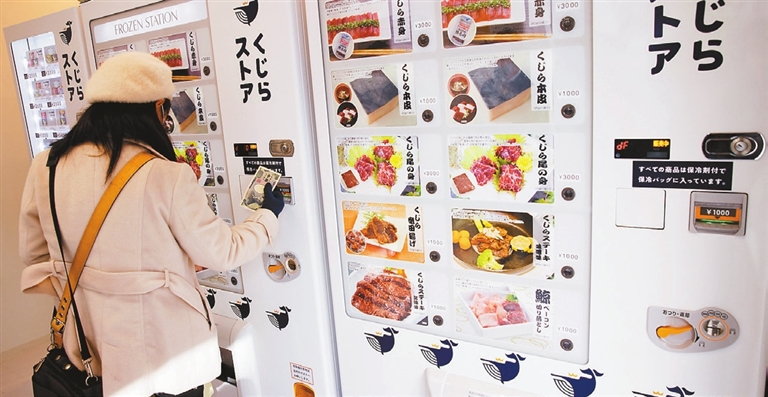
A JAPANESE whaling firm unveiled vending machines offering whale sashimi, whale steak and whale bacon in Yokohama on Tuesday in hopes of reviving sales of a food long in decline and shunned by many supermarkets. Wearing a whale-shaped hat, Kyodo Senpaku President Hideki Tokoro greeted prospective customers at the firm’s latest “unmanned store” — a trio of vending machines in Motomachi, an upmarket shopping district home to fashion boutiques and artisan bakeries. “There are many major supermarkets that are afraid of being harassed by anti-whaling groups so they won’t use whale. So there are many people who want to eat whale but can’t,” Tokoro said at the launch. “Therefore, we are opening stores with the thought that we can provide a place where those people can eat.” The products on sale mainly contain whale caught in Japan, a company spokesperson said, with prices ranging from 1,000 yen (US$8) to 3,000 yen. Though the government maintains that eating whale is a cherished part of Japan’s culture, consumption peaked in the early 1960s and has steadily declined as other protein sources became available and affordable. Whale meat consumption in Japan totaled just 1,000 tons in 2021, compared with 2.6 million tons for chicken and 1.27 million for beef, government data showed. At its peak in 1962, annual whale meat consumption was 233,000 tons. Conservationists say moves to promote whale meat are desperate attempts to revive interest in a struggling business. “Most Japanese people have never ever tried it. So how can it be something you call a nationwide culture if nobody’s really participating in it?” said Katrin Matthes, head of Japan policy for Whale and Dolphin Conservation (WDC), a global charity. The International Whaling Commission — a global body which oversees whale conservation — banned commercial whaling in 1986 after some species came close to extinction. But Japan continued hunting whales for what it said were research purposes. It pulled out of the IWC and resumed commercial whaling in 2019. Some passers-by near the store said they would be open to eating whale but they wouldn’t make a special effort. “I wouldn’t go out of my way to come (buy it). I usually eat chicken,” said Urara Inamoto, a 28-year-old customer service worker. Whale meat advocates point to its high protein content and low carbon footprint compared with other meats.(SD-Agencies) | 
